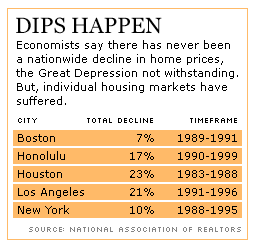BEND, Ore. (CNN/Money) – The unprecedented run of real estate has made millionaires out of people who've bought, sold and rented out property in the right places, at the right time.
Our "Tycoon in the Making" series has been chronicling some of these success stories.
Joshua Carlson, for example, is a Minneapolis law student who bought his first duplex after college and now owns about $1.75 million in real estate. Yvonne and Robert Cromer of San Diego bought their first house using a cash advance on their credit card for the downpayment and now own eight properties in three states. (see more profiles here)
Sounds easy. But investing in real estate is risky business.
"Property is an investment and it is susceptible to market forces, just like stocks" said Kenneth Roth, a seasoned investor and author of "Successful Landlord" (AMACOM). But you can sell stocks on a moment's notice -- it can take months to sell a piece of property.
What's the worst that could happen, you ask? "You plunge yourself further and further into debt, rental prices drop, you can't make your mortgage payments and you're forced to sell for less than you owe," said Roth, who experienced some of that first hand in the 1980s.
Successful investors, said Jon Duncan, director of RSM McGladrey's wealth management group, are comfortable taking on risk. But, that doesn't mean they throw caution to the wind. "Building wealth is a process of managing risk, not ignoring it," added Duncan.
Before you decide to become a "Tycoon" at all costs, give yourself a reality check. Here are some key questions to ask.
Can I really afford this?
The motto of many real estate investors is "you need to borrow money to make money." Not only do many of the real estate investors we profile take out mortgages on their investment properties, they often borrow the money for the down payment and other expenses.

| |
|
The Cromer family and other Tycoons in the Making are trying to get rich on real estate. Before following their lead, make sure you've thought about the risk. Click image to read more on investment property.
|
|
Whether you're buying rental property or a fixer-upper, however, you need to consider your entire financial picture before borrowing more money.
One rule of thumb, according to Bill Dallas, a board director with the California Mortgage Bankers Association, is this: Your total monthly payments for your house(s), car, school loans, credit cards and other fixed costs should not exceed 60 percent of your gross monthly income. So if your income is $5,000 a month, plan to spend no more than $3,000 a month on all of your expenses and debt obligations, he said.
If you plan to buy investment property that doesn't generate rent, your costs should fit into that equation. "What we see is people can't manage their expenses if the go over a total debt to income ratio of 60 percent," he said.
If you collect rental income, you can add that to the income side of the equation. But to play it safe, discount the amount by 25 percent, said Dallas. In other words, if you plan to collect $1,000 a month in rent, assume only $750 when calculating your debt-to-income ratio.
"I can tell you after [my own] owning property for 25 or 30 years that you will have vacancies and unexpected expenses," he said.
Do I have adequate reserves?
Financial planners recommend having enough emergency savings to cover at least three months worth of expenses. If you own a second home or are in the process of "flipping" a home, you'll want to make sure your emergency savings can pay for those mortgages as well.

If you bring in rental income, plan to have a separate reserve account to pay for vacancies, regular expenses and emergencies. This is where "discounting" your rental income comes into play. If you collect $1,000 in rent, put $250 in an account earmarked for your rental property.
Karen Hiller, executive director of Housing and Credit Counseling, Inc. in Topeka, Kan. said she sees landlords getting into trouble when they don't budget time or money to take care of their property. "This is a business that has to be actively run day to day," she said. "It's not a mutual fund."
Am I too optimistic about the market?
Over time, home values tend to increase at the same rate as income, according to David Stiff, a senior economist with Fiserv CSW. If you buy real estate with the assumption that prices will keep going up at a double-digit pace, you're setting yourself up for disappointment – and possibly foreclosure.
"I don't know how many people I've spoken with who say real estate never goes down," said Duncan.
| "Tycoons in the Making"
|

|
|
|
|
Though there has not been a nationwide decline in home prices since the Great Depression, prices do go down. Between 1983 and 1988, home prices in Houston fell 23 percent, according to the National Association of Realtors. Between 1991 and 1996, prices in Los Angeles fell 21 percent.
How do you protect yourself? In addition to making sure you can afford the extra mortgage and building a reserve fund, be conservative about how much you borrow from your home equity – particularly if you're borrowing from a home equity line of credit, which is likely to carry a variable interest rate.
While you're at it, don't turn your back on other asset classes, say veteran real estate investors. "I have a lot of money invested in real estate," said Dallas, who founded First Franklin Mortgage Corporation in 1981 and sold it in 1999 for $325 million. "But I allocate about 30 percent of my assets to this sector, and that includes my primary residence."
.

|